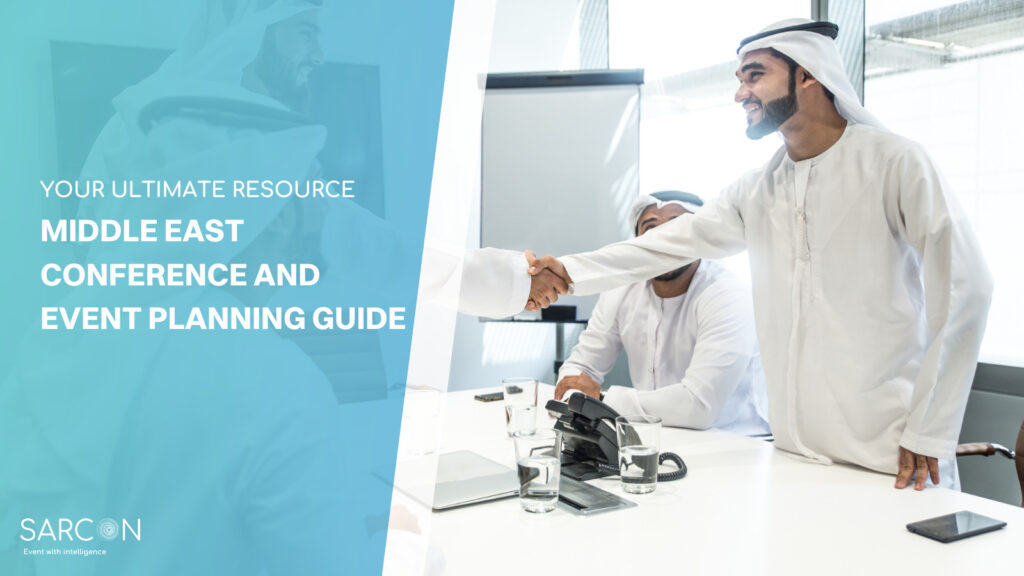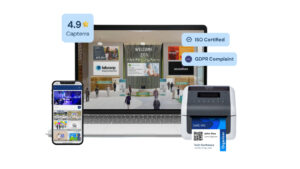The United Arab Emirates (UAE) stands as the unrivaled leader in the Middle East’s events industry, boasting cutting-edge infrastructure and hosting approximately half of all regional gatherings. Cities like Dubai and Abu Dhabi are renowned for their world-class facilities and amenities, making them premier destinations for conferences and events of all scales.
Every day, the Middle Eastern meetings, incentives, conferences, and exhibits (MICE) sector grows more vibrant and accessible.According to Research and Markets’ Middle East & Africa Events Market Forecast, the Middle East & Africa events market is projected to increase from US$ 53.63 billion in 2022 to US$ 76.67 billion in 2028, at a CAGR of 6.1% from 2021 to 2028.
While planning and executing the logistics for any conference is a challenging endeavor, and this task becomes even more complex when organizing events from overseas. With strategic planning and meticulous attention to detail, these hurdles are certainly surmountable. Whether you’re a local or an international planner, navigating the intricacies of event management in the Middle East requires careful consideration and comprehensive preparation.
How do you plan a successful Middle East conference or event?
Planning an event or conference in the Middle East comes with its unique set of opportunities and challenges. From navigating cultural nuances to leveraging cutting-edge technology, success hinges on meticulous planning and execution.
Follow these expert tips and insights to ensure your next event is a resounding success :
-
Define the objectives of your event
When planning an event, it is important to clearly define your objectives. Are you looking to host a virtual event, a hybrid event, or an in-person event? Each option has its own benefits and drawbacks, so it is important to choose the format that best suits your needs. Virtual events can be easily accessed by a global audience and do not require any travel, but they can lack the personal touch of an in-person event. Hybrid events offer the best of both worlds, allowing attendees to participate either in person or online. In-person events are great for networking and building relationships, but they can be logistically more complicated to plan and execute. No matter what type of event you choose to host, make sure that your objectives are clear from the start.
-
Choosing the Ideal Venue
Planning a conference or event in the Middle East starts with selecting the perfect venue. From luxurious hotels to state-of-the-art convention centers, the region offers a myriad of options to suit every need and budget.
-
- Luxurious Hotels with Conference Facilities
Middle East boasts an array of world-class hotels equipped with state-of-the-art conference facilities, making them ideal venues for hosting events of all sizes. Whether you prefer the opulence of Dubai’s skyline or the cultural charm of Abu Dhabi, these hotels offer unparalleled luxury and convenience. - Five-Star Accommodations with Conference Packages
Experience the epitome of luxury and convenience by choosing a five-star hotel that offers comprehensive conference packages. From spacious meeting rooms to gourmet catering services, these venues ensure a seamless and memorable event experience for attendees. - State-of-the-Art Convention Centers
For large-scale conferences and exhibitions, consider renting space at one of the region’s premier convention centers. Equipped with cutting-edge technology and ample space, these venues provide the perfect backdrop for showcasing your event on a grand scale. - Customizable Spaces for Events of All Sizes
Whether you’re hosting a small seminar or a major trade show, convention centers in the Middle East offer customizable spaces to accommodate events of all sizes. With flexible floor plans and advanced audiovisual capabilities, you can bring your vision to life with ease.
- Luxurious Hotels with Conference Facilities
-
Choose the right event management platform
UAE is one of the most connected countries in the world, and its people are some of the most tech-savvy. As a result, many businesses in UAE are choosing to use virtual or hybrid platforms to connect with their customers. However, picking the right platform can be a challenge. There are a number of factors to consider, including the type of business, the target audience, and the budget. For example, a platform like Skype might be suitable for a small business that wants to connect with customers, but it might not be performed in the Middle East, as the region has several restrictions on calls conducted using popular conferencing platforms like Zoom, Cisco Webex, and Skype.
While Dubai has been a go-to spot for international conferences for decades in the region,UAE maintains a strong censorship policy making these platforms illegal to use even with VPNS. While businesses all around the world have benefited enormously from adopting internet and video conferencing services to reach customers all over the world. There has been a major detrimental impact on Dubai’s major event business as a result of the restriction on VoIP services.
Ultimately, choosing the right virtual or hybrid platform depends on the specific needs of the business. So when it comes to choosing the right virtual or hybrid platform for your business, there are a few things to consider. First, what is your target market? If you’re looking to reach customers in the UAE or other parts of the Middle East, you’ll need a platform that supports Arabic. Second, what type of business are you running? If you’re providing service, you’ll need a platform that offers 1-on-1 communication. And finally, what’s your budget?
These factors are pivotal in determining the most suitable virtual, in-person, or hybrid event platform for your event based in the Middle East, particularly in Dubai. In a market where connectivity and technological advancement are crucial, it’s imperative to ensure that your chosen platform aligns with your business objectives and caters to the preferences of your audience.
Here’s a detailed guide on what to look for when selecting an event management platform:
- Multilingual Support: Given the diverse demographic of the Middle East, including Dubai, prioritizing a platform that supports Arabic language is crucial. Ensure the platform offers seamless translation features and supports Arabic communication to effectively engage with your target audience.
- Communication Features: Depending on your business model, prioritize platforms that offer robust communication features, including 1-on-1 messaging capabilities. This ensures personalized interactions and fosters meaningful connections between attendees, exhibitors, and sponsors.
- Integration Capabilities: Look for platforms that seamlessly integrate with your existing tools and systems, such as payment gateways, video conferencing solutions, and communication tools. This ensures smooth coordination and enhances the overall event experience.
- Scalability and Security: Opt for platforms that can effortlessly scale to accommodate events of various sizes and complexities. Additionally, prioritize platforms like Sarcon that adhere to international data security standards, such as ISO 27001, 27701, and GDPR, to ensure the protection of sensitive information.
- Marketing Tools: Evaluate the platform’s event marketing capabilities, including SMS, WhatsApp, and email marketing tools. Advanced features like Pixel tracking and Google Tag Manager integration can enhance attendee engagement and provide valuable insights for future events.
- Flexible Event Formats: Ensure the platform supports diverse event formats, including in-person, virtual, and hybrid seamlessly. This flexibility allows you to adapt to changing circumstances and cater to the preferences of your audience effectively.
- Customization Options: Look for platforms that offer easy-to-use customization tools for designing event websites or microsites. Customization options enable you to create a branded and intuitive interface that enhances visibility and attracts a wider audience.
- Mobile Event Apps: Consider platforms like Sarcon that offer mobile event apps to enhance attendee engagement and accessibility. Mobile apps provide attendees with on-the-go access to event information, schedules, networking opportunities, and interactive features. Look for apps that are user-friendly, customizable, and compatible with various mobile devices to ensure seamless participation and a memorable event experience for all attendees.
For more information read :A Comprehensive Guide to Choosing the Right Mobile Event App
-
Engaging Attendees and Maximizing Impact
An engaging and interactive event is essential for leaving a lasting impression on attendees. From captivating keynote speakers to immersive networking opportunities, focus on creating memorable experiences that resonate long after the event concludes.
-
Select the right speakers and content experts
Curate a lineup of dynamic keynote speakers and industry thought leaders to inspire and educate attendees. Choose speakers with diverse backgrounds and expertise to offer unique perspectives on relevant topics and trends. Moreover, with so many events now being virtual, hybrid, or in-person, it is essential to choose people who are comfortable with the chosen format and who are able to engage the audience.
For a virtual event, for example, you will want to choose speakers who are experienced in presenting online and who are skilled in using virtual tools such as video conferencing and webinars . For a hybrid event, you will need to select speakers who are comfortable with both virtual and in-person formats. And for an in-person event, you will need to choose speakers who can hold the attention of an audience and who are skilled in public speaking. By carefully selecting the right speakers and content experts, you can ensure that your event is a success.
-
Networking Opportunities and Social Events
Facilitate meaningful connections among attendees by organizing networking sessions and social events. Whether it’s a cocktail reception, a gala dinner, or a themed party, creating opportunities for networking fosters professional relationships and enhances the overall attendee experience.
Incorporate virtual networking platforms like Sarcon to connect attendees both onsite and remotely. Utilize technology to facilitate one-on-one meetings, group discussions, and virtual networking events that transcend geographical barriers and enhance engagement.
-
Market and promote your event in Middle East
Whenever you plan an event, no matter what the scale is, you need to market and promote it effectively to ensure success. The Middle East offers a wealth of opportunities for event planners, with a range of virtual, hybrid and in-person events taking place across the region.
However, before you start promoting your event, it’s important to consider your audience and what type of event will appeal to them. Once you have a clear idea of your target market, you can start planning your marketing and promotion strategy. There are a number of ways to promote an event in the Middle East, including online advertising, PR campaigns, direct marketing and word-of-mouth. While each method has its own advantages, the most effective way to reach your target audience is through a combination of different techniques. By carefully planning your marketing and promotion strategy, you can ensure that your event is a success.
-
Manage the event logistics
Logistical planning plays a vital role in the success of any conference or event. From transportation and accommodations to catering and audiovisual requirements, meticulous attention to detail is essential.
Event management software can help you keep track of event logistics and ensure that everything runs smoothly. Event Management softwares can help you manage event schedules, venue reservations, and guest list. In addition, event management software can also help you track event expenses and create event budgets. By using event management software, you can help to make sure that all event logistics are taken care of in a professional and organized manner.
Sarcon is a great option if you’re looking for a virtual and hybrid event platform in the UAE. It’s ideal for enterprises that require top-notch video and audio conferencing along with other features like gamification, various track options, a rapid networking zone, the ability to personalize settings, and more.
- Understanding Cultural Nuances:
Cultural sensitivity is paramount when planning conferences and events in the Middle East. It’s essential to familiarize yourself with local customs, traditions, and etiquette to ensure seamless interactions with attendees and hosts. For instance, respecting Islamic practices such as prayer times and fasting during Ramadan is crucial. Moreover, dress codes, gender segregation norms, and protocols for addressing dignitaries vary across the region and should be observed accordingly.
- Navigating Legal and Regulatory Requirements:
Navigating legal and regulatory requirements is essential for hosting conferences and events in the Middle East. Depending on the location and nature of the gathering, permits, licenses, and approvals may be necessary from local authorities. It’s advisable to work with experienced legal advisors or event planning professionals who can assist with compliance and ensure adherence to relevant laws and regulations.
- Evaluate results and learn from your experience
Evaluating the results of your virtual, hybrid, or in-person experience is an essential step in learning from your experience. By taking the time to assess what worked well and what could be improved, you can ensure that your next experience is even more successful.
For example, there is no one-size-fits-all answer when it comes to deciding whether to hold virtual, hybrid, or in-person events. The best way to determine what will work best for your organization is to experiment and then evaluate the results. You might want to try holding a virtual event for your next webinar but experiment with a hybrid format for your annual conference. By trying out different formats and evaluating the results, you can learn what works best for your organization and make sure that your events are successful.
Additionally, by sharing your insights with others, you can help them to learn from your experience as well. Therefore, evaluating your experience is not only a valuable learning opportunity for yourself, but also for the people around you.
What are the key components of a Middle East conference or event agenda?
There are a few key components that should be included in any Middle East conference or event agenda. First, it is important to provide an overview of the current situation in the region. This will set the stage for the rest of the conference and help participants to understand the context in which the event is taking place. Next, the agenda should focus on the topics that will be addressed during the conference.
Finally, it is also important to leave time for networking and socialising. This is often one of the most valuable aspects of conferences and events, as it gives participants a chance to build relationships and exchange ideas. By including these key components, organizers can ensure that their conference or event is successful and productive.
How can you ensure that your attendees have a positive experience at your conference or event?
As any event planner knows, ensuring that your attendees have a positive experience is essential for the success of your conference or event. There are a number of ways to achieve this, but some key strategies include providing clear and concise information, ensuring that all logistical details are taken care of, and creating a welcoming and inclusive environment.
- Make sure that your attendees have all the information they need in order to participate in your event. This means sending out clear and concise communications in advance, and having staff representatives on hand who can answer any questions or address any concerns.
- Take care of all the logistical details beforehand so that everything runs smoothly on the day of the event. This includes making sure that there are enough dry runs before the actual event.
- Create a warm and welcoming atmosphere at your event. In the case of physical events include things like providing name badges and making sure that your signage is legible and easy to follow, for virtual events this may include engaging features like photo wall, gamification, leaderboard, reaction feature etc. By taking these steps, you can help to ensure that your attendees have a positive experience at your conference or event.
What are some common mistakes made in planning Middle East conferences and events, and how can you avoid them?
One of the most common mistakes made when planning conferences and events in the Middle East is failing to take into account the cultural differences and technical/ connectivity issues that can arise. This can lead to problems with everything from food and beverage choices to the timing of the event. It is important to do your research and work with local partners to ensure that your event is respectful of local customs and traditions.
Another mistake that is often made is failing to plan for security concerns. In many parts of the Middle East, security risks are a reality, and it is important to work with experienced security providers to ensure that your event is safe and secure. Opting for a robust virtual and hybrid event platform can help you minimize this risk, look for platforms that are ISO 27001, 27701 and GDPR-compliant like Sarcon.
Finally, many organizers fail to take into account the logistical challenges of planning an event in the Middle East. Ensure that your virtual event platform is capable of handling the logistics and ensuring a smooth event. By avoiding these common mistakes, you can ensure that your conference or event is a success.
Conclusion
There will likely be an increase in the number of hybrid events as more and more Middle Eastern countries embrace hybrid and virtual events . By planning a successful conference or event, you can create an engaging and informative experience for your attendees. Planners of in person events have a firm grasp on what makes for a successful gathering, and they are increasingly looking to virtual solutions to help gain an edge over their competitors.
Event planners and businesses in the Middle East would do well to work with a trustworthy technology partner when conceptualizing their virtual and hybrid events.To avoid common mistakes made in planning these events, be sure to consult with experienced professionals like Sarcon. With careful planning, your Middle East conference or event will be a success!





